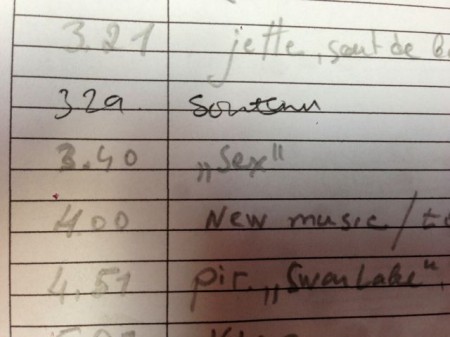
Above is a little fragment of daily life as a ballet accompanist – keeping your ears open while a rehearsal is going on so that when the choreographer or coach asks to go from “sex” or “the Swan Lake pirouette,” you’re already on it, because you or someone else already wrote it down in the appropriate place in the score as they were talking (or on a sheet of paper with a minutes-and-seconds count next to it if you’re working with a recording). There’s one thing you really don’t want to hear, and that’s a sigh of barely-concealed exasperation followed by “Oh just play from the beginning and we’ll pick it up.”
The trouble comes when you’ve got several scores, several people teaching the same piece, and several people making rehearsal marks. On a really well-marked score, the same place might be marked with all the things that different people have called that place over time, so that you’ll find it whether the coach asks to go from the pirouette, the arabesque, the second step, the repeat, “Svetlana”, “egg on face” or “a little bit back from where the mother comes on”. You can read them all out to the room until you hit the one that the dancer or coach recognises, but it’s more likely that whatever technical problem has occasioned going back to that place is what they’ll call it, rather than what it was called when the piece was choreographed, when narrative and production was the order of the day.
There aren’t many really well marked scores in the world. With the best intentions to keep to a system, you can’t help idiosyncracies and gaps creeping in. Sometimes, a place in the score is so significant and “obvious” that nobody has bothered to mark it at all, because “everyone would know” that this is the pas de deux, or the boy’s solo, or the death scene.
For a freelancer who doesn’t know everything that’s going on in a company, the possibility for error is compounded by the lack of costumes. Unless someone announces what the rehearsal is for, you might not know whether the person you’re playing for is the prince, the Nutcracker, the mouse king or a soldier, so if the coach says “from where he comes on, please,” you don’t have a clue who “he” is. If you guess wrong, you might have just insulted the new principal, so it’s best to aim high and work your way down if you’re not sure. As a guest Russian ballerina once put it during a rehearsal of Onegin (I think) that had completely thrown her, “the trouble is, without costumes, it’s like watching television with the sound turned down. I don’t know who anyone is.”
See also:

